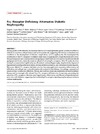Please use this identifier to cite or link to this item:
https://accedacris.ulpgc.es/jspui/handle/10553/75027
| DC Field | Value | Language |
|---|---|---|
| dc.contributor.author | Lopez-Parra, Virginia | en_US |
| dc.contributor.author | Mallavia, Beñat | en_US |
| dc.contributor.author | Lopez-Franco, Oscar | en_US |
| dc.contributor.author | Ortiz-Muñoz, Guadalupe | en_US |
| dc.contributor.author | Oguiza, Ainhoa | en_US |
| dc.contributor.author | Recio Cruz, Carlota Pilar | en_US |
| dc.contributor.author | Blanco, Julia | en_US |
| dc.contributor.author | Nimmerjahn, Falk | en_US |
| dc.contributor.author | Egido, Jesus | en_US |
| dc.contributor.author | Gómez-Guerrero, Carmen | en_US |
| dc.date.accessioned | 2020-10-27T09:46:40Z | - |
| dc.date.available | 2020-10-27T09:46:40Z | - |
| dc.date.issued | 2012 | en_US |
| dc.identifier.issn | 1046-6673 | en_US |
| dc.identifier.uri | https://accedacris.ulpgc.es/handle/10553/75027 | - |
| dc.description.abstract | Among patients with diabetes, increased production of immunoglobulins against proteins modified by diabetes is associated with proteinuria and cardiovascular risk, suggesting that immune mechanisms may contribute to the development of diabetes complications, such as nephropathy. We investigated the contribution of IgG Fcg receptors to diabetic renal injury in hyperglycemic, hypercholesterolemic mice. Weused streptozotocin to induce diabetes in apolipoprotein E–deficientmice and in mice deficient in both apolipoprotein E and g-chain, the common subunit of activating Fcg receptors. After 15 weeks, the mice lacking Fcg receptors had significantly less albuminuria and renal hypertrophy, despite similar degrees of hyperglycemia and hypercholesterolemia, immunoglobulin production, and glomerular immune deposits. Moreover, diabetic Fcg receptor–deficient mice had less mesangial matrix expansion, inflammatory cell infiltration, and collagen and a-smooth muscle actin content in their kidneys. Accordingly, expression of genes involved in leukocyte infiltration, fibrosis, and oxidative stress was significantly reduced in diabetic kidneys and in mesangial cells cultured from Fcg receptor–deficient mice. In summary, preventing the activation of Fcg receptors alleviates renal hypertrophy, inflammation, and fibrosis in hypercholesterolemic mice with diabetes, suggesting that modulating Fcg receptor signaling may be renoprotective in diabetic nephropathy. | en_US |
| dc.language | eng | en_US |
| dc.relation | SAF2009/11794 | en_US |
| dc.relation | PI10/00072 | en_US |
| dc.relation | RECAVA RD06/0014/0035 | en_US |
| dc.relation.ispartof | Journal of the American Society of Nephrology : JASN | en_US |
| dc.source | Journal of the American Society of Nephrology : JASN [ISSN 1046-6673], v. 23 (9), p. 1518-1527 | en_US |
| dc.subject | 3207 Patología | en_US |
| dc.subject | 320506 Nefrología | en_US |
| dc.title | Fcγ Receptor Deficiency Attenuates Diabetic Nephropathy | en_US |
| dc.type | info:eu-repo/semantics/article | en_US |
| dc.type | Article | en_US |
| dc.identifier.doi | 10.1681/ASN.2011080822 | en_US |
| dc.identifier.pmid | 22859852 | - |
| dc.description.lastpage | 1527 | en_US |
| dc.identifier.issue | 9 | - |
| dc.description.firstpage | 1518 | en_US |
| dc.relation.volume | 23 | en_US |
| dc.investigacion | Ciencias de la Salud | en_US |
| dc.type2 | Artículo | en_US |
| dc.utils.revision | Sí | en_US |
| dc.identifier.ulpgc | No | en_US |
| dc.contributor.buulpgc | BU-MED | en_US |
| dc.description.sjr | 5,307 | |
| dc.description.jcr | 8,987 | |
| dc.description.sjrq | Q1 | |
| dc.description.jcrq | Q1 | |
| dc.description.scie | SCIE | |
| item.grantfulltext | open | - |
| item.fulltext | Con texto completo | - |
| crisitem.author.dept | GIR IUIBS: Farmacología Molecular y Traslacional | - |
| crisitem.author.dept | IU de Investigaciones Biomédicas y Sanitarias | - |
| crisitem.author.dept | Departamento de Ciencias Clínicas | - |
| crisitem.author.orcid | 0000-0002-8832-2826 | - |
| crisitem.author.parentorg | IU de Investigaciones Biomédicas y Sanitarias | - |
| crisitem.author.fullName | Recio Cruz, Carlota Pilar | - |
| Appears in Collections: | Artículos | |
WEB OF SCIENCETM
Citations
36
checked on Feb 22, 2026
Page view(s)
48
checked on Jan 10, 2026
Download(s)
57
checked on Jan 10, 2026
Google ScholarTM
Check
Altmetric
Share
Export metadata
Items in accedaCRIS are protected by copyright, with all rights reserved, unless otherwise indicated.
